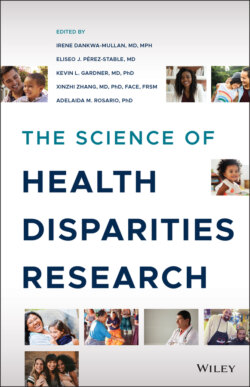Читать книгу The Science of Health Disparities Research - Группа авторов - Страница 59
3.5.2 Hispanic Community Health Study/Study of Latinos
ОглавлениеThe Hispanic Community Health Study/Study of Latinos (HCHS/SOL), colloquially referred to as SOL, is a multisite, community‐based, longitudinal study of the health of Latino populations in the United States. Participants were selected to be representative of the target population in four communities: the Bronx, NY; Chicago, IL; Miami, FL; and San Diego, CA. The study enrolled participants from diverse national backgrounds, including Cuban, Dominican, Puerto Rican, Mexican, Central American, and South American.
Using data from HCHS/SOL, Kershaw and colleagues used two easily assessable measures of acculturation to investigate the relationship between acculturation level and favorable levels of cardiovascular risk factors [28]. They used nativity and years lived in the United States to derive a three‐level acculturation variable: (i) low acculturation: foreign‐born and lived in the United States less than 10 years, (ii) moderate acculturation: foreign‐born and lived in the United States equal to or more than 10 years, and (iii) high acculturation: US‐born. Among cardiovascular risk factors, the study assessed cholesterol levels, systolic and diastolic blood pressure, fasting plasma glucose, current smoking, electrocardiograph abnormalities, and stress due to ethnic discrimination.
Results from multivariable‐adjusted models showed that low‐acculturated women had significantly higher odds of favorable levels of cardiovascular risk factors compared to moderate‐ or high‐acculturated women. Further, favorable levels of cardiovascular risk factors differed significantly among men by their national background. For example, moderate‐acculturated Dominican men had significantly higher odds of favorable levels of cardiovascular risk factors compared to their low‐acculturated counterparts.
One of the limitations of this study is its cross‐sectional design and, therefore, inability to examine changes in health behaviors over time and determine temporality. The HCHS/SOL study has longitudinal follow‐up and will eventually be able to assess these factors over time. Another limitation is that the study may have overadjusted for covariates that may be on the causal pathway between acculturation level and favorable levels of cardiovascular risk factors.
Despite these limitations, the present study exhibits how acculturation level can influence established risk factors for chronic health conditions and how that relationship can differ among subpopulations of immigrants.
